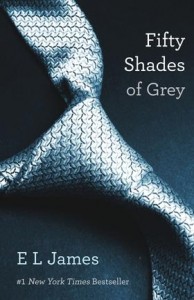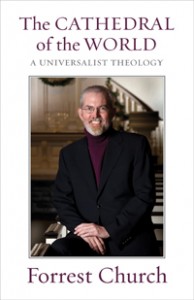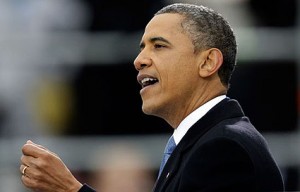So, being a major religion dork, I did not, needless to say, spend my winter break reading this:
Nope. Instead, I could be found reading this:
It is a beautiful book called The Cathedral of the World on Unitarian Universalist theology, written by Forrest Church, an inspiring Unitarian Universalist minister and theologian who struggled through a long battle with terminal cancer. The title of the book reflects the metaphor that Church used for Unitarian Universalism: that this world is a “cathedral” with people looking through many different windows (which symbolize different religions and worldviews)–but that the light coming in those windows is the same (the light being God, or the Divine). In fewer words: “many windows, one light.”
Church drew a parallel between that idea and our former national motto (until the Red Scare of 1950s caused it to be changed to “In God We Trust”) of “E pluribus unum”–out of many, one. He finds power in our differences and diversity, religious and otherwise.
Church dedicates a large part of the book to what he calls the American Creed, which is expressed in the Declaration of Independence with the words, “We hold these truths to be self-evident, that all men are created equal, that they are endowed by their Creator with certain unalienable rights, that among these are Life, Liberty, and the pursuit of Happiness.”
He argues that is this creed–not our military victories nor the riches of capitalism–that make America great. It is not what we have done that makes us strong; it is what we strive to do. Church points out that we are far from flawless–inequities from slavery to tribal sovereignty to segregation and more have stained the fabric of our history. But, at our best, we fight for the realization of that creed–equality and freedom and the possibility of having a fulfilling life for us all.
For Church (and for me), this American Creed is highly religious. It is inextricably tied to our understanding that we are all God’s creations and therefore interdependent and intertwined. To honor God is to bring these rights to all people.
You can imagine my goosebumps, then, when President Obama took the podium at the inauguration ceremony this Monday and said:
We affirm the promise of our democracy. We recall that what binds this nation together is not the colors of our skin or the tenets of our faith or the origins of our names. What makes us exceptional – what makes us American – is our allegiance to an idea, articulated in a declaration made more than two centuries ago:
“We hold these truths to be self-evident, that all men are created equal, that they are endowed by their Creator with certain unalienable rights, that among these are Life, Liberty, and the pursuit of Happiness.”
Today we continue a never-ending journey, to bridge the meaning of those words with the realities of our time. For history tells us that while these truths may be self-evident, they have never been self-executing; that while freedom is a gift from God, it must be secured by His people here on Earth.
It sounded like someone had been reading Forrest Church. And I liked it. Normally, I’m quite cynical about politics and usually ready to point out problematic policies. But this part of Obama’s speech was something that transcended politics. It was universalist theology. And by that I don’t mean that it was only meant for Universalists.
No, it was a universal message. And I believe that despite our political and/or religious affiliations, it is a creed we can all strive toward together.


